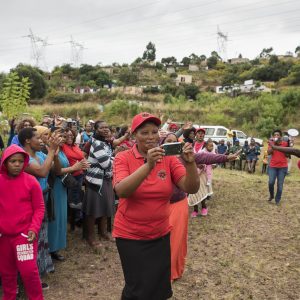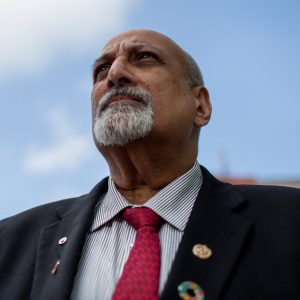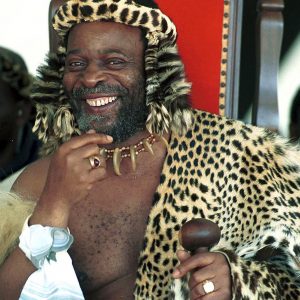From the Archive | Walter Rodney’s last speech
In his final speech before being murdered, the Guyanese historian and activist, who was born this week in 1942, warned of a new Constitution that gave the president a monarch’s powers.
Author:
25 March 2021

Walter Rodney was a prominent pan-Africanist and Marxist who was declared a persona non grata by the government of Jamaica in 1968. He was close to CLR James, who he met in London. Rodney worked at the University of Dar es Salaam for a number of years before returning to Guyana in 1974. He was assassinated by a car bomb in Georgetown in 1980.
This is a lightly edited excerpt from a speech given on 6 June 1980 and first published in Sign of the Times: A Memorial Booklet to Commemorate our Fallen Teacher on the First Anniversary of his Death Georgetown, Guyana: Working People’s Alliance, 1981, 5-15.
Sign of the times
Brothers and sisters, hail! Hail! You have heard brother Rupert Roopnaraine, you have seen him and you know that he is in fine form. (Applause) We want to let you know that brother Omawale is also here with us, and he is also in fine form. As the brother in the street would say, I man Ire, I man dread, which simply means that whatever pressures may be coming down we are determined to resist. Our will to struggle has not in any way been lessened; on the contrary, today we feel stronger than ever, we feel more confident than ever, not simply in our own ability and capacity, because that would be incorrect. We feel more confident because of the demonstrated ability and capacity of the people as a whole. (Applause)
The people’s will to struggle
There are many ways, some of them big and some of them small, in which our people continue to demonstrate their ability. I will give but two small examples. The first is to let you know that whatever happens our people manage to maintain their sense of humour as a barge, as a weapon, against the oppressor. And I can assure you that there is very little that the oppressor can do when you use your very humour and wit as a weapon against them. A simple example, you may have heard that a number of brothers and this sister in New Amsterdam were arrested and charged with putting up a poster. Well, the fact of the matter is simply this: that the individuals concerned were engaged in an activity and apparently when they looked at a certain structure, which was a public convenience recently built, someone decided that this public convenience should be immediately renamed Burnham’s Palace. (Laughter) The enemy cannot cope with that.
I can give you another kind of example, a much more serious example. It relates to our brother Edward Dublin, because many of you in Georgetown would not know that brother, who was executed by a section of the police carrying out the orders of this regime, for political reasons. Now normally when a brother falls in the struggle, there are some political movements which try to suggest that he was a saint, that he was a perfect human being, that he was always an angel from the time of his birth. We have thought to suggest nothing of the kind. What we do know is that brother Edward Dublin was what you would call a “street force”, a brother who had been kicked out of the work force at Linden. And when you get kicked out of the work force the only force you can join is the street force. So the brother was on the street force, and what was important while he was hustling a living was that he managed to acquire a certain political awareness, decided that it wasn’t worth while getting into petty crime and getting into conflict with the police. He decided that he would never again lend his services to be bought off as a mercenary and a thug by the regime. And because this brother took that stand, he became a threat to the PNC (Peoples National Congress) and the ruling class and their representatives in the Wismar/McKenzie area, and he was executed. What I am trying to say is simply this: The revolution is made by ordinary people, not by angels, made by people from all walks of life, and more particularly by the working class who are in the majority. And it is a sign of the times, a sign of the power of revolutionary transformation, when a street force member is developed into a fighting cadre in a political movement. (Applause)
Related article:
In many ways, brother Rupert Roopnaraine, brother Omawale and myself owe to you, the Guyanese people, a word of thanks. The Working People’s Alliance as an organisation, all the members, owe to you a word of thanks for the immense solidarity and support which is developing, which continues to develop in this period. But while offering this word of thanks, we also want to make it clear that the solidarity which we have seen is itself an indication that people are struggling for their own rights. These are times, many times, when a people decide to identify with a cause, not simply because they feel the individual, the group or the cause requires support, but because they calculate, correctly, that that is the method by which they would advance their own interest at a particular point in time. This is not new in the history of this country. I was reflecting myself, through a certain familiarity with some aspects of our own history in this country, and I recalled the names of two Guyanese: they may not be known to you but I will leave their names in your memory after tonight.
One of them was named John Rohlehr, and for those of you who know this country that is the name that tends to be associated with Berbice – so he came from Berbice. He was a Black Guyanese, and in the late 1880’s John Rohlehr returned to this country as a qualified medical practitioner, the first Black Guyanese to demand to be employed by the colonial medical service. As you would expect, he was discriminated against, and initially the colonial medical service said no, they would not employ Dr John Rohlehr. The mass of the people of this country, from one end to another, carried out a tremendous campaign on his behalf until, ultimately, special enabling legislation had to be passed to allow him to practice. But what was important is that when they struggled for and behind John Rohlehr, they were also struggling for their own right. And it is a good thing that subsequently he also participated in the movement for the provision of dispensaries and hospitals for the mass of poor people in this country. (Applause)
Related article:
And I want to recall in the same breath the name of a Guyanese to the name of Louis DeSouza; you needn’t know where he came from to recognise that he was a Guyanese of Portuguese origin, one of the first Portuguese to take some active part in the public life of this country. Louis DeSouza was a barrister, a fearless barrister, who went into the colonial courts and challenged corruption; and because he challenged corruption from the top down, beginning with the Chief Justice, he was brought up on a charge of contempt of court and he was jailed. And when DeSouza was jailed, and even when his trial was going on, the mass of the people of Georgetown invaded the courtroom. They had a hard time holding back the ordinary people because they could get over the hurdle that he was Portuguese, this didn’t bother them even though there were many Portuguese businessmen whom they might consider as exploiters. Nevertheless, the ordinary people of this country rallied behind Louis DeSouza; he was one of the most popular men in this country because when he challenged the corruption of the Chief Justice and the courts he was really striking a blow which they themselves wished to strike. And by the same token, today, when we speak of human rights and the violation of rights of particular individuals, we are really expressing the question of the basic right of the majority of the people.
The new constitution and the self-proclaimed monarch
The Working People’s Alliance has prepared a certain display, a certain visual display, which is an attempt to make clear the connection between one’s constitutional rights and the fact of whether one eats or does not eat, or the factor indeed of whether one drinks or does not drink milk. And this poster which we have is a reference to Shahabadeen’s Constitution, which we sometimes call Shahab’s Constitution, better known as the Paramount Constitution. But what our brothers and sisters did was to prepare a poster which shows you a new trade mark: Shahab’s Ideal Evaporated Constitution. (Applause) And this constitution is a special Constitution in which human rights are subtracted. Now you see the point of the poster is to let you understand that no milk and no constitution are not two separate things. You can’t walk down the road grumbling about no milk and forget the fact that we do not have a free constitution; the two things are part and parcel of the same. That is the message!
Brother Roopnaraine spoke about the way in which the rulers in this country have a capacity to impose the worse hardship on people and then turn around and make it appear as through they are doing you a tremendous favour; so that when they ban milk they ask you to clap your hands and cheer that they have achieved the world’s first Guyana banned milk way. (Laughter) This is the kind of absurdities to which they reduce us. On another occasion I had cause to refer to the same phenomenon in very crude language; I did so deliberately and I have to repeat it because the situation warrants the crudity. I said that what the rulers do is to shit and piss on us, and they tell us we must call it perfume. (Prolonged laughter)
Related article:
I want to speak a while about the constitution which you have not seen; brother Eusi Kwayana mentioned that fact. Now that in itself is one of the most important facts that you must consider. What is a constitution, apart from being a piece of paper? It is a document which supposedly represents the fundamental law of the country; everything else which is in the statute bodies and the law books depend upon the constitution. That is the basis of our entire legal life.
Of course the constitution has some confusing language, suggesting that they are responsible to parliament. But how can the assistant to the president be responsible to anybody but the president? If you are his assistant you are responsible to him, that is the nature of our constitution. And how does a man come to wield these tremendous powers? Supposing we were to say, the constitution argues that if he was to win a majority, a large majority of popular support, he should enjoy these powers. But that is not so. First of all King Kong himself will never face the electorate. The constitution simply says that the present prime minister, on the day appointed for the new constitution to come into effect, shall assume office as president as though he was elected thereto, as though he were elected. So the reign shall begin automatically. For some future president it is said that his party should win an election on the List Proportional System. And if his party wins, then his party can automatically make him president. But there is no provision for this very powerful, this immensely powerful individual, to be chosen directly by the Guyanese people. Now there are two questions we have to consider; the first is that it is clearly a trick to put the particular individual into power. But the second question, which is equally important, is that no individual, whoever, should have that kind of power and should be put into office in such a trivial way. No individual should have absolute power in any state; and it really is a situation of absolute power which the constitution is seeking to give the so-called executive president.
Related article:
I will give a final illustration of that power by letting you know how the people can get rid of this president, or how they can try to get rid of the reign of the president. There is a very complicated procedure by which those in power in the parliament wish to try and remove the president because they think he has committed some gross criminal act or something of the sort, they have to go through a number of stages to see if they can remove him. First of all, a notice has to be given to the speaker, signed by no less than one-half of all the elected members of the assembly, alleging that the president has committed a violation of the constitution. And then, after a number of other steps, this motion is put to the National Assembly, but the National Assembly cannot debate it immediately. They will go ahead to appoint the chancellor – I have to go over this rather quickly – but ultimately the chancellor will appoint a tribunal who will consider whether the allegations are justified. And if this tribunal, which will be headed by some mythical independent chancellor of the judiciary – just like the Jonestown Inquiry was headed by a mythically independent chancellor of the judiciary who subsequently said he did not want to hear anything about Jonestown – we will have a tribunal which will decide whether it is justified that this president should be removed. And if the tribunal, by chance, should say that he should be removed they can go back to the Assembly and the Assembly can vote, by a three quarters majority, that the president should be removed. Now if all of this happens, the president will have to resign within three days, unless, and this is it, unless before that time he himself dissolves the parliament. (Disturbed laughter)
Now, in any nation in the world the process of making a constitution is one of the most fundamental political processes. You have to engage in debate, you have to engage in discussion, you have to present the facts, you have to bring in all manner of groups to ensure that it is clearly a public discussion. Yet we can go ahead in this country, the rulers are threatening to impose a constitution on us and the vast majority of the Guyanese people have not even set eyes on this document. Now do you imagine they have things in there that they want you to see? That constitution is filled with a lot of perfume. (Laughter) It talks about the powers of the president. You know this constitution is mainly about a president; a man is going to become something called an executive president. It is supposed to be a Republican constitution. But in the New Nation, which is the organ of the People’s National Congress (it is not a paper that is dedicated to bringing down the government), in the New Nation, in referring to the president under the new constitution they spoke about the reign of the president. In case you didn’t get the point, the word reign is only associated with a monarchy, only a king reigns, a president is supposed to have a term of office. But a king reigns and the New Nation spoke about the reign of the king. That could only be one king they were speaking about – the well known Kong. (Prolonged laughter)




